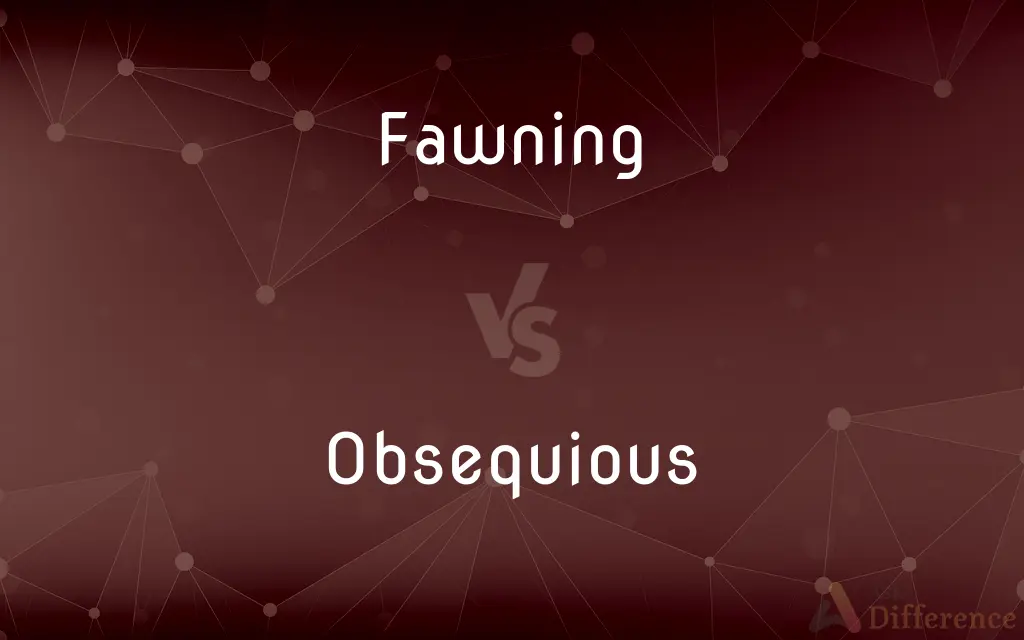Fawning vs. Obsequious — What's the Difference?
By Urooj Arif & Maham Liaqat — Updated on April 4, 2024
Fawning involves exaggerated flattery or affection to gain favor, whereas obsequious behavior is overly obedient or attentively servile.

Difference Between Fawning and Obsequious
Table of Contents
ADVERTISEMENT
Key Differences
Fawning is characterized by displaying exaggerated flattery or affection, often to gain favor or advantage from someone in power. Obsequiousness, on the other hand, entails a degree of servility that goes beyond mere flattery, involving excessive eagerness to help or obey someone, often to the point of being overly submissive.
While both behaviors are aimed at ingratiating oneself with another, particularly those in positions of authority or influence, fawning tends to be more about overt displays of adulation or devotion. In contrast, obsequious behavior can manifest as an overzealousness to serve, comply, or defer to someone’s wishes, sometimes at the cost of one's dignity or self-respect.
Fawning can often seem insincere or superficial, as it involves putting on a display of affection or admiration that may not be genuinely felt. Obsequious behavior, however, can be perceived as lacking in backbone or self-respect, as it involves a willingness to lower oneself to gain approval or favor.
In essence, while both fawning and obsequious behavior seek approval, the former does so through flattery and apparent affection, whereas the latter does so through submissive helpfulness and compliance. This distinction highlights the subtle nuances in the dynamics of power and approval-seeking behaviors.
The application of these terms in everyday language underscores their pejorative nature, as both describe ingratiating behaviors that are generally viewed negatively, suggesting a lack of authenticity or strength of character in the individual exhibiting them.
ADVERTISEMENT
Comparison Chart
Definition
Exhibiting exaggerated affection or flattery to gain favor.
Showing excessive eagerness to help or obey, to the point of servility.
Key Behavior
Flattery and apparent devotion.
Submissive helpfulness and compliance.
Perception
Often seen as insincere or superficial.
Viewed as lacking self-respect or dignity.
Aim
To ingratiate oneself through affection.
To ingratiate oneself through obedience.
Connotation
Negative, suggesting superficiality.
Negative, suggesting lack of backbone.
Compare with Definitions
Fawning
Showing exaggerated flattery or affection to please someone.
The assistant's fawning attitude toward the director was obvious to everyone.
Obsequious
Acting overly submissive or attentive to impress.
His obsequious mannerisms were aimed at winning the client's favor.
Fawning
Acting with exaggerated eagerness to be noticed or approved.
The newcomer's fawning over the celebrities was embarrassing.
Obsequious
Behaving in a manner that is excessively compliant or deferential.
Obsequious followers rarely earn genuine respect from their leaders.
Fawning
Using flattery or subservience to achieve one's ends.
Fawning behavior at work often leads to mistrust among colleagues.
Obsequious
Exhibiting a sycophantic attitude towards someone in authority.
The obsequious tone in her emails was intended to curry favor.
Fawning
Behaving in an overly affectionate way to gain favor.
His fawning compliments were intended to secure a promotion.
Obsequious
Demonstrating servility to a degree that suggests a lack of dignity.
The aide’s obsequious behavior made others uncomfortable.
Fawning
Demonstrating servile deference beyond genuine affection.
Her fawning laughter at every joke seemed forced and insincere.
Obsequious
Full of or exhibiting servile compliance; fawning.
Fawning
To exhibit affection or attempt to please, as a dog does by wagging its tail, whining, or cringing.
Obsequious
Excessively eager and attentive to please or to obey instructions; fawning, subservient, servile.
Fawning
To seek favor or attention by flattery and obsequious behavior.
Obsequious
(archaic) Obedient; compliant with someone else's orders or wishes.
Fawning
Present participle of fawn
Obsequious
(obsolete) Of or pertaining to obsequies, funereal.
Fawning
Seeking favor by way of flattery; flattering, servile.
Obsequious
Promptly obedient, or submissive, to the will of another; compliant; yielding to the desires of another; devoted.
His servants weeping,Obsequious to his orders, bear him hither.
Fawning
Servile flattery.
Obsequious
Servilely or meanly attentive; compliant to excess; cringing; fawning; as, obsequious flatterer, parasite.
There lies ever in "obsequious" at the present the sense of an observance which is overdone, of an unmanly readiness to fall in with the will of another.
Fawning
Attempting to win favor from influential people by flattery
Obsequious
Of or pertaining to obsequies; funereal.
Obsequious
Attempting to win favor from influential people by flattery
Obsequious
Attentive in an ingratiating or servile manner;
Obsequious shop assistants
Obsequious
Showing excessive willingness to serve or obey.
The obsequious employee never disagreed with the manager, regardless of the situation.
Common Curiosities
Is fawning considered a positive trait?
No, fawning is generally viewed negatively, as it implies insincerity or manipulation.
Why do some people exhibit obsequious behavior?
Individuals may exhibit obsequious behavior out of insecurity, a desire for acceptance, or ambition to advance their status or position.
How can one respond to obsequious behavior in the workplace?
Setting clear boundaries and encouraging open, honest communication can help mitigate obsequious behavior.
Can fawning behavior be harmful?
Yes, fawning behavior can undermine one’s credibility and relationships, as it often comes across as insincere.
Is it possible to change from being a fawning or obsequious person?
Yes, with self-awareness and effort, individuals can learn to communicate more authentically and confidently.
What impact does fawning have on relationships?
Fawning can erode trust and respect, potentially damaging relationships over time.
How does social media influence fawning behavior?
Social media can amplify fawning behavior, as individuals may seek approval or attention through exaggerated expressions of admiration.
Are there cultural differences in the perception of obsequious behavior?
Yes, cultural norms can influence how obsequious behavior is perceived, with some cultures viewing deference more positively than others.
Can obsequious behavior be justified in any context?
While sometimes seen in professional contexts to show respect, excessive obsequiousness is typically viewed as a lack of self-respect.
How does one differentiate between genuine kindness and fawning?
Genuine kindness is sincere and unconditional, whereas fawning seeks to gain favor or approval through exaggerated flattery.
How can organizations discourage fawning and obsequious behavior?
Promoting a culture of authenticity, respect, and merit-based recognition can help discourage such behaviors.
Can obsequious behavior be a strategy for career advancement?
While it might yield short-term gains, obsequious behavior can ultimately be detrimental to one’s professional reputation and relationships.
Can children display fawning or obsequious behavior?
Children can exhibit these behaviors, often mimicking social dynamics they observe in adults.
Is fawning ever a coping mechanism?
Yes, fawning can be a coping mechanism for dealing with insecurity or anxiety in social situations.
What role does power dynamics play in fawning and obsequious behavior?
Power dynamics greatly influence these behaviors, with individuals often directing their efforts towards those in positions of authority or influence.
Share Your Discovery

Previous Comparison
Melismatic vs. Syllabic
Next Comparison
Artist vs. ArtisteAuthor Spotlight
Written by
Urooj ArifUrooj is a skilled content writer at Ask Difference, known for her exceptional ability to simplify complex topics into engaging and informative content. With a passion for research and a flair for clear, concise writing, she consistently delivers articles that resonate with our diverse audience.
Co-written by
Maham Liaqat













































